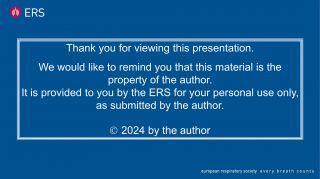18 April, 2024 | Online
18:00-19:00 CEST
Chair: Prof. Ian M. Adcock (London, United Kingdom)
Speaker: Dr James Schofield (Southampton (Hampshire), United Kingdom)
Fees: Free for ERS members / €10 for non-members
Find out more about becoming a member
A lot of emphasis in research has been placed on omics analyses, and plenty of data sets are publicly available for further interrogation and integration. Moreover, various levels of omics can be integrated to obtain an even deeper level of understanding of biological and pathogenic processes.
In order to make sense of the huge amount of data and their complexity, the fusion of computational and biological knowledge is instrumental. Artificial intelligence is increasingly employed to recognise patterns in data, including omics data, which aids in the diagnosis, phenotyping and (personalised) treatment of pulmonary diseases.
Easy to use, low-code and no-code AI solutions make this technology widely accessible.
Educational aims
- To understand the significance, transformative impact and utility of (combined) omics approaches in studying complex biological systems. By highlighting their relevance in the context of lung disease characterisation, this webinar aims to inspire clinicians, trainees and researchers to explore and utilise these cutting-edge techniques in their own scientific pursuits.
- To emphasise the importance of interdisciplinary collaboration between basic translational scientists, clinicians and bioinformaticians in order to effectively harness the power of (combined) omics approaches for advancing our understanding of lung diseases.
- To raise awareness about the untapped potential of existing datasets; encouraging clinicians, researchers and trainees to explore and mine these resources, including through the use of low-code or no-code AI to extract valuable insights and generate new hypotheses.
Topics
- Understand the value of integrated multi omics approaches
- Learn how to integrate omics data sets
- How to connect (multi) omics data to cellular processes
- How (multi) omics can help understand pathogenic processes in lung diseases
- How no code and low code AI work and how it can be used to make sense of omics data
Target audience:
- Clinicians
- Trainees
- Basic Translational scientists
- Bioinformatician
Format
This webinar will include a workshop with interactive quizzes, Q&A with audience, presentation of seminal papers and introduction to analysis workflows.
Learning outcomes
After following this webinar, participants should be able to:
- Understand the relevance of multi omics in disease characterization.
- Learn how to undertake and assess multi omics.
- Understand the basics of no code and low code AI and how they can be used to make sense of omics data
CME credit
An application for accreditation of this webinar has been made to the European Board for Accreditation in Pneumology (EBAP) for 1 CME credit per 1-hour attendance. If accredited, the CME credit will be granted upon attendance of at least 60 minutes during the live webinar only.
What is a webinar?
A webinar closely simulates a lecture-based teaching experience. The speaker can interact with the audience, just as in a classroom setting. During the webinar, you will be asked to share your opinion on issues related to the topic using interactive polls.
All participants will be able to hear the lecturer and see the slides throughout the presentation. As a participant you will be able to pose questions or discuss ideas with the other participants via the text chat facility and the speaker will respond to the questions via the microphone.
Login guidelines
More information will be communicated in due course.
- Please log in to the webinar 20 minutes before it is scheduled to commence. If you have any technical difficulties whilst trying to log in or during the session please contact e-learning@ersnet.org.
- Check Central European Time.
- To achieve the best quality, we recommend to avoid downloading anything from the internet during your connection to the lecture and stopping all other programmes.
- Please also ensure that your audio settings are not set to mute and adjust the volume to a comfortable level.

